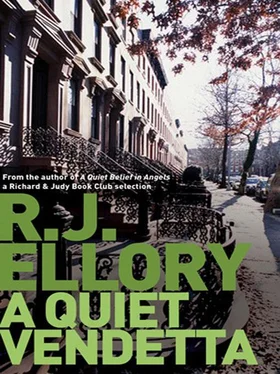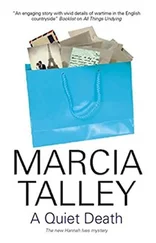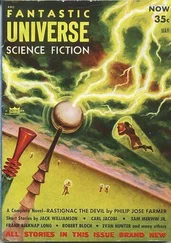He started when someone knocked on the door.
Ray Hartmann opened his eyes and lowered his hands.
The door opened, and Bill Woodroffe, same expression as before, stepped inside and nodded at Hartmann.
‘Ten minutes,’ he said, ‘We’re gonna take the call out here where we have other agents on additional lines.’
Hartmann rose from the chair, walked around the table and followed Woodroffe.
They passed down the corridor and took the second door on the right. The room looked like mission control at Houston: banks of computers, gray free-standing dividers separating dozens of desks one from another, floor-to-ceiling maps on three of the walls, endless rows of file cabinets, and in amongst this a good dozen Bureau men, all of them in white shirts and dark ties.
‘Hold up!’ Woodroffe shouted over the murmur of voices.
The room fell silent. Could have heard a pin drop.
‘This is Special Investigator Ray Hartmann from New York. He is part of the Judiciary Subcommittee on Organized Crime up there. This is the guy that’s gonna take the call.’
Woodroffe let his words sink in for a moment.
Hartmann felt a dozen pairs of eyes watching him.
‘So when the call comes we take it in three stages. Feshbach, Hackley and Levin are gonna take the first pick-up on line one, Landry, Weber and Duggan the second, finally Cassidy, Saxon and Benedict on line three. When all three teams have picked up, Mr Hartmann will take line four right here. If there is the slightest sound from anyone in the room when the call has been connected through the speakers they will take a two-week unpaid suspension. This is a young girl’s life we’re talking about, gentlemen, understood?’
There was a hushed series of acknowledgements across the room.
‘So that’s the game plan. Mr Kubis will trace the call and record it as per protocol. So take your seats, gentlemen, and wait it out.’
Woodroffe indicated that Hartmann should take a seat at the desk ahead of him. Hartmann did so. He glanced at the wall clock. Four minutes to seven. He could feel the tension in his throat and chest. His hands were moist, and beneath his hairline beads of sweat were breaking out. This was not what he had intended to be doing this evening.
At six-fifty-eight someone sneezed. Woodroffe ordered the man from the room.
The place was deathly quiet.
Hartmann could feel his heart thudding in his chest. He wanted to close his eyes for a moment, open them and find that all of this had vanished, that it had been nothing more than some strange non-sequitur dream. He did not dare close his eyes. He could not appear to be unsettled by this in any way. Like Woodroffe had so clearly stated, a young girl’s life was at risk.
Six-fifty-nine.
Hartmann glanced up at Woodroffe. Woodroffe looked back dispassionately. This was business, nothing more nor less than business. Hartmann’s presence would naturally be resented. He may have been bound by the same legal and judicial code of practice, but sure as shit he wasn’t family.
He looked back at the phone and willed it to ring. He wanted to know. He wanted to hear this man’s voice, to know instantly who it was, to turn to Woodroffe and tell them exactly where they would find him and how to rescue the girl…
He wanted to be back on a plane to New York knowing that he would see Carol and Jess next Saturday.
He inhaled.
The phone rang and Hartmann nearly left his skin.
‘Line one,’ Woodroffe barked.
‘Line two.’
Hartmann’s heart thudded like a derailed freight train in his chest.
‘Line three… go!’
A moment’s pause, a moment that stretched out for ever.
Woodroffe’s hand on his shoulder.
Hartmann watching his own hand as it reached for the receiver ahead of him.
Now , Woodroffe mouthed, and Ray Hartmann – he of the broken heart and bitterness, he of the regrets and darker aspects, his mind filled with nothing more than the wish to see his wife and daughter next Saturday noon – lifted the phone.
‘Yes?’ he said, his voice subdued, almost cracking.
‘Mr Ray Hartmann,’ the voice at the other end of the line returned. ‘Welcome home to New Orleans…’
Later, the lights out, through the window from the street the faint glow of New Orleans as it ached in slow-motion through the chilled hours of early morning, Ray Hartmann asked himself why he had chosen this life.
A life of crime, if you like; others’ crimes, but crimes all the same.
Just as with the police, the FBI, the county coroners and medical examiners, all those whose lot it was to scour the underbelly of America, to turn over the stones, to search out the darker shadows and find what lurked within, he had somehow – through fate or fortune – found himself charged with this duty. The killers, the serial rapists, the hitmen, the murderers, the child molesters, the assassins, the psychopaths, the sociopaths, the guilty, the tormented, the tortured and depraved. Here, in all its resplendent glory, was the worst the world could offer, and he – he of all people, wishing now for nothing more than safety and sanity for himself and his family – was once again walking along the edge of the abyss, looking down, tempting equilibrium, challenging his own sense of balance to see if this time, this time, he would fall.
Back in New York, in the office complex he shared with Luca Visceglia and the crew, were the details of a hundred thousand lives wrecked by a collection of truly crazy people. Even the FBI’s January 1997 release of fifteen thousand pages of documents relating to the Mafia, the death of Kennedy, of Jimmy Hoffa, the workings of the Teamsters’ Union and the killing of their associates and cohorts, gave no indication of the extent to which the government and its many systems had been infected by corruption and Machiavellian dishonesty. Even Hoover, perhaps the most shrewd and conniving hypocrite of them all, had once commented, ‘I never saw so much skullduggery…’
Ray Hartmann had spent hundreds of hours immersed in the history and heritage of these people. He remembered vividly the conversations he and Visceglia had started and never seemed to finish in the small office they had first shared. Back then Hartmann had believed himself cognizant of the methods and motives of these people, but Visceglia had illustrated his naivety.
‘Never really been anything other than the Gambino and Genovese crime families,’ Visceglia had told him. ‘Those families were established many generations before any of the stuff we have to deal with. Those people divided New York like it’d always belonged to them… like it had always been their own.’
Visceglia chain-smoked, he drank too much coffee. He possessed an air of philosophical resignation regarding his place in life. He seemed to carry the weight of this darkened world on his shoulders, and those shoulders would bow and strain beneath the pressure, but they would never give.
‘Stressed?’ Hartmann had asked him one time, and Visceglia had smiled wryly, nodded his head as if such a thing was the understatement to shame all understatements, and said, ‘Stressed? Like the Brooklyn fucking Bridge, Ray… like the Brooklyn fucking Bridge.’
Hartmann had acknowledged him but hadn’t known what else to say. In the face of what they were dealing with what could one say?
‘Billions of dollars,’ Visceglia said. ‘And these people own territories that cross the fucking world, and all of it gained within a handful of decades. It beggars belief sometimes, it just beggars fucking belief. Lives are lost with no more concern than a five-dollar hand of poker. This whole thing goes back forever… and this is where the names you have heard come from, people like Lucky Luciano, Bugsy Siegel, Meyer Lansky and Al Capone.’
Читать дальше







![Quiet Billie - Don't mistake the enemy [СИ]](/books/421973/quiet-billie-don-t-mistake-the-enemy-si-thumb.webp)




